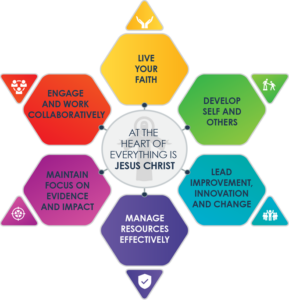
The Catholic School Office (CSO) Diocese of Maitland-Newcastle is committed to being a provider of choice for families in our community and to delivering excellence that supports students’ formation, wellbeing and educational outcomes. The Leadership Framework highlights our commitment as a system to building leadership capacity and capability and a strong leadership culture that will support our aspirations and mission moving forward.
The Catholic Schools Office values and recognises the capacity for staff at all levels to exercise leadership and to contribute to our mission, regardless of whether they occupy a formal leadership role or position in a school or the CSO.
Purpose
The Leadership Framework provides a common language for all CSO and system staff and provides a structure to support the professional growth and career paths of existing and aspiring leaders. For teaching staff, the framework is designed to be used in conjunction with the relevant Australian Professional Standards for Teachers and Australian Professional Standard for Principals.
The framework provides the opportunity for all staff to reflect on what it means to be a Catholic school leader; to reflect on their leadership practice; identify strengths and areas for improvement; and choose appropriate professional learning activities that support their leadership development.
Through informing the design of professional development pathways, the Leadership Framework together with appropriate professional support will attract more staff to leadership roles and support conversations regarding effective leadership.
The Leadership Framework captures the characteristics and behaviours of good leadership articulated through six leadership capabilities that staff at all levels can practise and develop.

Leadership Capabilities
Leadership capabilities are sets of key behaviours and attributes that support the strategic direction of the Catholic Schools Office by building capability and a strong leadership culture.
The CSO Leadership Framework describes six Leadership Capabilities that provide a common language and focus for all teaching and support staff to model good leadership practice and to develop their own and others’ leadership capability. The framework is not exhaustive and does not seek to list every capability required within the system. Many roles will have specialised skill sets unique to their role, and these should be considered alongside the Leadership Framework. For teaching staff, the framework is designed to be used in conjunction with the relevant Australian Professional Standard for Teachers and the Australian Professional Standard for Principals.
Leadership Links
Australian Professional Standards for Teachers
Australian Institute for Teaching and School Leadership
ViewAustralian Professional Standards for Principals
Australian Institute for Teaching and School Leadership
ViewAccreditation to Work, Teach and Lead
Handbook for Catholic Schools in the Diocese of Maitland-Newcastle
View
Aims
The Leadership Framework has several aims including:
- Clearly articulating the leadership capabilities required to create and sustain faith-filled Catholic school communities
- Being explicit about the leadership capabilities required to create and sustain effective learning environments within Diocesan Catholic schools
- Supporting self-evaluation and reflection
- Guiding the formation and growth of potential and current school leaders within and across schools
- Guiding staff in their selection of leadership pathways and professional learning appropriate to and reflective of career stage and experience
- Supporting PP&D and review processes
- Supporting the development of professional development programs
- Informing recruitment and selection process
- Proactively supporting the changing landscape and context of leadership in a Catholic school
Accreditation to Work, Teach and Lead
The Catholic school community has a responsibility to put into place appropriate and supportive yet rigorous pathways for the preparation and ongoing professional learning of teachers, especially in Religious Education, and for the professional and spiritual formation of those who will lead our schools into the future.
Financial Support Offered by the CSO
The CSO currently remunerates one-half (50%) of Accreditation to Teach Religion and Accreditation for Senior Leadership course fees for students who are undertaking approved courses of study in RE/Theology/Catholic Leadership and who are permanently employed in diocesan schools.
Study leave of one day per unit per semester is offered for those undertaking Accreditation to Teach Religion and Accreditation for Senior Leadership. Some casual release (code 86) is provided for those undertaking accreditation modules in categories A to C.
To claim remuneration, staff should present a copy of their transcript and receipt of payment of fees after successful completion of each unit to the RE and Spirituality Services team at the CSO to receive their remuneration.
Courses for Gaining Accreditation
There are a number of courses, seminars and programs available through Broken Bay Institute (BBI) and Australian Catholic University (ACU) to support school and CSO staff to achieve accreditation in the various categories.
Courses for Gaining Accreditation to Teach Religion
Those wishing to gain Accreditation to Teach Religion can enrol in one of the following courses:
- A major undergraduate course of study in Religious Education/Theology in the B Ed or other undergraduate teaching degree at a Catholic tertiary institution (minimum of six approved units of study) OR
- A degree in Theology or allied disciplines at a Catholic tertiary institution OR
- A postgraduate qualification in Religious Education/Theology at a Catholic tertiary institution (minimum of four postgraduate units of study) OR
- A CSO approved qualification in Religious Education/ Theology from an endorsed provider (minimum of four postgraduate units of study).
Courses for Gaining Accreditation for Senior Leadership
The requirements for Accreditation for Senior Leadership are as follows:
- Have completed the Faith Story Witness module
- Be Accredited to Teach Religion (Category D)
- Have completed a minimum of 4 additional units of study at a postgraduate level in Religious Education/Theology/Catholic Leadership at a Catholic tertiary institution. The units would be in addition to any subjects covered to achieve Accreditation to Teach Religion.
It is recommended that staff who are undertaking a Master of Educational Leadership degree for Senior Leadership Accreditation seek advice from Bernadette Gibson, Head of RE and Spirituality Services at the Catholic Schools Office.
Accreditation at a Glance
This table outlines the Accreditation to Work, Teach and Lead requirements for staff working in the Catholic Diocese of Maitland-Newcastle.

